

Music for dementia. Activites for Eldery People. Puzzles To Remember. Dance and dementia report. Using technology to support people with dementia - SCIE. Exercise programs for people with dementia - Forbes - 2013 - The Cochrane Library - Wiley Online Library. Plain language summary Exercise programs for people with dementia Background In future, as the population ages, the number of people in our communities suffering with dementia will rise dramatically.
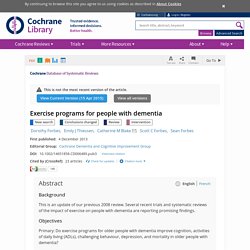
Activities for people with dementia. Welcome to The Reader - The Reader. Arts 4 Dementia. Empowerment through artistic engagement. List of British bingo nicknames. This is a list of British bingo nicknames.
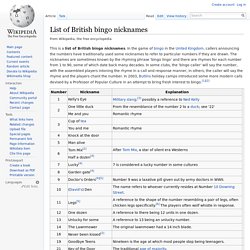
In the game of bingo in the United Kingdom, callers announcing the numbers have traditionally used some nicknames to refer to particular numbers if they are drawn. The nicknames are sometimes known by the rhyming phrase 'bingo lingo' and there are rhymes for each number from 1 to 90, some of which date back many decades. In some clubs, the 'bingo caller' will say the number, with the assembled players intoning the rhyme in a call and response manner, in others, the caller will say the rhyme and the players chant the number. In 2003, Butlins holiday camps introduced some more modern calls devised by a Professor of Popular Culture in an attempt to bring fresh interest to bingo.[1][2] References[edit] External links[edit] British Bingo Slang also has a sizeable list as well as some discussion of the origin of the names. Art as Therapy—Can Creative Expression Soothe Dementia Symptoms? With a final stroke of the brush, Laura Baxter puts finishing touches on her painting, a piece of abstract art others deem a masterpiece.
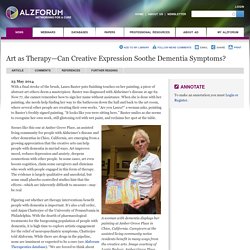
Baxter was diagnosed with Alzheimer’s disease at age 62. Now 77, she cannot remember how to sign her name without assistance. When she is done with her painting, she needs help finding her way to the bathroom down the hall and back to the art room, where several other people are creating their own works. “Are you Laura?”
A woman asks, pointing to Baxter’s freshly signed painting. Scenes like this one at Amber Grove Place, an assisted living community for people with Alzheimer’s disease and other dementias in Chico, California, are emerging from a growing appreciation that the creative arts can help people with dementia in myriad ways. Creative Dementia Arts - Home. Arts-and-Dementia-Toolkit.pdf. Dementia_and_sight_loss_poster.pdf. Personal enjoyment: participation and engagement : Dementia-friendly environments – Victorian Government Health Information.
Creating opportunities for personal enjoyment | Daily living and past social roles | Creating a life story | Meaningful and purposeful daily living | Failure-free daily living | Physical design for successful daily living | Rummaging | Changes you can make now Encourage joining in Create a sense of belonging Design daily living according to personal life histories Design meaningful and purposeful, failure-free daily living Design spaces for domestic, work-related and leisure activities Encourage exercise for physical and mental health Not knowing where I am doesn’t mean I don’t know what I like!

Mozley et al. 1999 A positive, home-like environment for people with dementia can give personal enjoyment. For comfort and pleasure, a person first has to feel at home in a familiar personalised environment. Regular physical activity can: lift a person’s mood help deal with negative feelings improve sleep reduce tension levels reduce feelings of stress or fatigue increase energy. Common problems.
Connecting people with Dementia with Nature and Exercise. Playlist for Life. The use of music in dementia care. As populations of developed nations age, so the number of cases of dementia increases.

As a way of helping care for and support people with dementia, music has been shown to often have a dramatic effect. Whether it’s 60s soul, operatic arias or songs from the shows, music can soothe, stimulate and bring to mind long-forgotten memories. Nick Smurthwaite investigates... Dementia is rapidly becoming the health and social care challenge of the 21st century. Numbers affected are set to soar because of an expanding older population. The total number of people with dementia in the UK is predicted to be in excess of 1m by 2021. The power of music The power of music, especially singing, to unlock memories and kickstart the grey matter is an increasingly key feature of dementia care.
Gardening with dementia, Thrive's work with dementia patients, gardening reduces anxiety and stress. Your Brain Matters - Exercise your brain. How much and what type of mental activity do you need to do to reduce your risk of dementia?
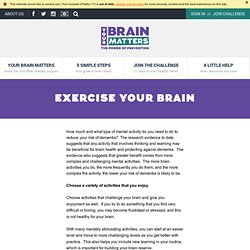
The research evidence to date suggests that any activity that involves thinking and learning may be beneficial for brain health and protecting against dementia. The evidence also suggests that greater benefit comes from more complex and challenging mental activities. The more brain activities you do, the more frequently you do them, and the more complex the activity, the lower your risk of dementia is likely to be. Choose a variety of activities that you enjoy Choose activities that challenge your brain and give you enjoyment as well. Arts 4 Dementia. Keeping people with dementia active and occupied – SCIE Dementia Gateway.
I must keep active, but it takes it out of you.
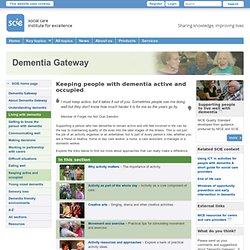
Sometimes people see me doing well but they don’t know how much harder it is for me as the years go byMember of Forget me Not Club Swindon Supporting a person who has dementia to remain active and still feel involved in life can be the key to maintaining quality of life even into the later stages of the illness. This is not just the job of an activity organiser or an entertainer, but is part of every person’s role, whether you are a friend or relative, home or day care worker, a nurse, a care assistant, a manager or a domestic worker. Explore the links below to find out more about approaches that can really make a difference. Research overview What the research says Video Minimising the use of restraint in care homes for older people: creative approaches E-learning module The life course approach. Activities.pdf. Activities for people with dementia. Each day there are many things that provide us with purpose and pleasure.
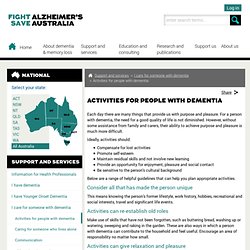
For a person with dementia, the need for a good quality of life is not diminished. However, without some assistance from family and carers, their ability to achieve purpose and pleasure is much more difficult. Ideally, activities should: Compensate for lost activitiesPromote self-esteemMaintain residual skills and not involve new learningProvide an opportunity for enjoyment, pleasure and social contactBe sensitive to the person’s cultural background Below are a range of helpful guidelines that can help you plan appropriate activities. Consider all that has made the person unique This means knowing the person’s former lifestyle, work history, hobbies, recreational and social interests, travel and significant life events. Activities can re-establish old roles Make use of skills that have not been forgotten, such as buttering bread, washing up or watering, sweeping and raking in the garden. Dementia activities - Dementia guide.
Keeping an active social life is key to helping someone with dementia feel happy and motivated.
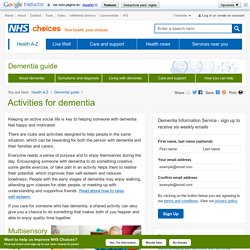
There are clubs and activities designed to help people in the same situation, which can be rewarding for both the person with dementia and their families and carers. Everyone needs a sense of purpose and to enjoy themselves during the day. Encouraging someone with dementia to do something creative, some gentle exercise, or take part in an activity helps them to realise their potential, which improves their self-esteem and reduces loneliness. People with the early stages of dementia may enjoy walking, attending gym classes for older people, or meeting up with understanding and supportive friends. Read about how to raise self-esteem. Dementia and Alzheimer’s Activities, Resources and Signage. Leicester Royal Infirmary, Meaningful Activity Service for People with Dementia (poster).pdf.